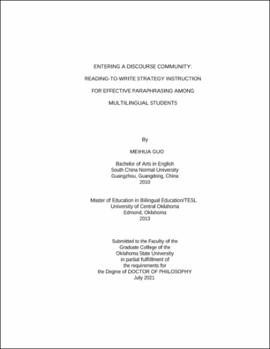| dc.contributor.advisor | Link, Stephanie | |
| dc.contributor.author | Guo, Meihua | |
| dc.date.accessioned | 2022-01-09T19:44:17Z | |
| dc.date.available | 2022-01-09T19:44:17Z | |
| dc.date.issued | 2021-07 | |
| dc.identifier.uri | https://hdl.handle.net/11244/333663 | |
| dc.description.abstract | Accidental plagiarism may result when a novice writer cannot construct an eligible paraphrase. From the early part of this century, some scholars argue that composition professionals at the college level should not teach paraphrase construction during composition classes (Yamada, 2003). Yet, some other scholars presented evidence that explicit instructions in how to paraphrase would be beneficial for novice reader-writers. The purpose of the study is to examine whether and to what extent a five-step paraphrasing approach, which featured linguistic analytical construction process and relied on a prototypical model whose effectiveness has been supported by anecdotal positive reflections, had positive impact on the performance of freshman multi-lingual reader-writers. Paraphrasing skills are crucial in assisting ESL reader-writers into the academic community. Paraphrasing, as one format of reading-to-write tasks, also represents academic literacy in college. Therefore, the current study recruited a group of voluntary ESL freshman reader-writers to receive a six-week intervention, which fit well into the International composition curriculum in the local educational context. The in-depth examination into how students performed in paraphrasing tasks and how they perceived the intervention unraveled how the intervention impacted participants' behaviors and metacognitive awareness when working on paraphrasing tasks in various discourse contexts throughout the intervention. Findings showed that participating reader-writers as a group made progress in paraphrasing tasks. Two focal reader-writers presented different patterns of paraphrasing behaviors in the two major essays they submitted for the course. The study concluded that the five-step paraphrasing approach instructions were facilitative for freshman multi-lingual reader-writers' paraphrasing performance and helped to raise their metacognitive awareness during the paraphrasing task completion process. | |
| dc.format | application/pdf | |
| dc.language | en_US | |
| dc.rights | Copyright is held by the author who has granted the Oklahoma State University Library the non-exclusive right to share this material in its institutional repository. Contact Digital Library Services at lib-dls@okstate.edu or 405-744-9161 for the permission policy on the use, reproduction or distribution of this material. | |
| dc.title | Entering a discourse community: Reading-to-write strategy instruction for effective paraphrasing among multilingual students | |
| dc.contributor.committeeMember | Halleck, Gene | |
| dc.contributor.committeeMember | Sicari, Anna | |
| dc.contributor.committeeMember | Kennison, Shelia | |
| osu.filename | Guo_okstate_0664D_17258.pdf | |
| osu.accesstype | Open Access | |
| dc.type.genre | Dissertation | |
| dc.type.material | Text | |
| dc.subject.keywords | paraphrasing | |
| dc.subject.keywords | reading-to-write | |
| dc.subject.keywords | strategy instruction | |
| thesis.degree.discipline | English | |
| thesis.degree.grantor | Oklahoma State University | |
